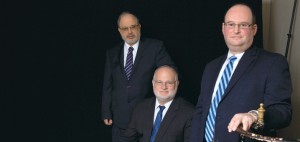A Fascinating Session with Mishpacha Magazine

The questions were probing and at times invasive (in a positive way), the discussion was penetrating and on occasion tense, and I came away having learned a ton about the root causes and deeper significance of what is transpiring in contemporary Modern Orthodoxy and its relationship to the Open Orthodox movement.
Last week, the Gordimer residence was privileged to host a Mishpacha Magazine roundtable discussion about Open Orthodoxy, convened and moderated by Eytan Kobre, US Desk Editor at Mishpacha Magazine, with the participation of Rabbi Steven Pruzansky and Rabbi Yoel Schonfeld. R. Eytan challenged us with questions that reflected his intimate familiarity with the history and background of the issues under discussion, pushing hard to get to the true heart of the matter. What emerged was a far deeper appreciation of the subject and the complex factors at play; much of what was articulated was really quite surprising and totally new to me.
Cross-Currents readers who are interested in finding out more should please take a look at this week’s edition of Mishpacha Magazine. (Photo credits to Amir Levy of Mishpacha Magazine)



We have subscribed to both Mishpacha and Yated as a protest against the editorial and news coverage of the Jewish Week for a number of years, There is more Kavod HaTorah for RIETS and its RY in both Mishpacha and the Yated than the JW. The interview was an important survey of the threats posed by OO and its founders, and leaders. One wonders when the MO leadership will confront OO and its threat to MO.
You left something out. Mishpacha and Yated also promote metzitza be-peh. When will that MO leadership finally see the light on that one?
I didn’t say that I agreed with everything in either Mishpacha or the Yated-I stated that both give a far more complete view of the mainstream committed MO and Charedi communities and rabbinic leadersbhip and what are the issues that face both communities than you will find in the JW
that is why mishpacha wrote about the Rav ztl without the benefit of an interview with those who knew him best: his children and RAL ztl. Rav Schechter did a very good job capturing the Rav as he saw him. I assume a more complete picture was not their objective.
Rav Mordechai Gifter, in his tshuva on the Ageretz HaRamban says that revamping Halacha, in addition to going OTD, is oiver on Kibud Av Veem.
I read the Mishpacha article and felt that it was very fairly and accurately written. The article explained the vast gulf that divides Open Orthodoxy from most of the rest of the frum Orthodox community. .It is factually accurate and uses irony more than hyperbole to make points. It isn’t nasty and shows understanding. So yasher koach.
Tonight,moztoei shabbos parshas Toldos happens to be the official installation of the new senior rabbi at the Hebrew Institute of Riverdale. Your article clearly expresses appreciation for the ahavas yisroel of Rabbi Avi Weiss. I agree that the next generation will make further innovations and that there is a schism .
The question that is still not answerable is how important and effective Open Orthodoxy will be outside of the frum world. Will it attract those who would otherwise feel out of place in the orthodox community and will it in any way stem the tide of intermarriage and assimilation. Both the Reform and Conservative movements are shoadows of their former selves. The yeshivish and chassidic communities are booming, but there is a vast gulf in between of people who are bored out their minds with shul and come for social reasons and whose observance of tradition more a matter of rote than belief. Rabbi Pruzansky is proud that his shul has 7 minyanim in the morning So does the shul II attend in Baltimore. But, Open Orthodoxy is not appealing to those people.It'[s demographic is different and only time will tell if it becomes a large movement or remains a niche movement. I do not know.
The Mishpacha interview was a thoughtful discussion.
R. Gordimer was quoted that in the 1950’s and 1960’s, even if there was laxity in halacha, “there wasn’t the idea of theological compromise that Open Orthodoxy has introduced”.
Even in the 1960’s, there was already an extreme left on ideological issues, even if it was smaller. I think that in R. Chaim Dov Keller’s June, 1970, Jewish Observer article , “Modern Orthodoxy: An Analysis and a Response” he mentioned biblical criticism, and he didn’t hold it past certain voices to abolish Yom Tov Sheni.